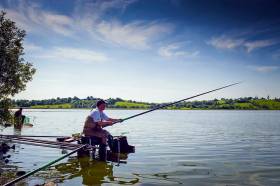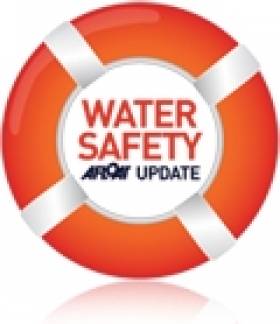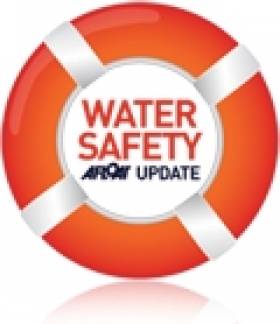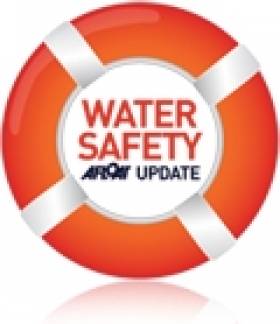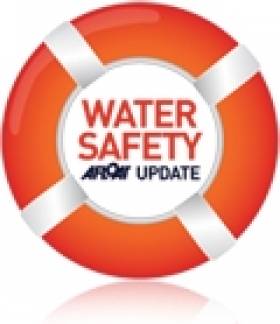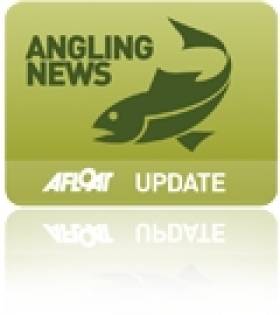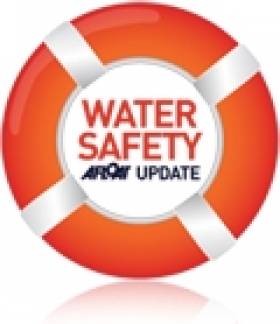Displaying items by tag: Heatwave
#Angling - Inland Fisheries Ireland (IFI) is appealing to anglers and fishery managers to voluntarily cease salmon angling on catch-and-release rivers with immediate effect due to high water temperatures and the current drought conditions.
The agency also advises that for conservation purposes on open rivers, anglers should cease angling once their daily bag limit is reached.
With regard to keep nets on coarse fisheries, IFI advises that this practise should be suspended at this time.
IFI says it will monitor the situation and issue updates as appropriate. Should the current weather conditions continue, the agency may consider the introduction of emergency conservation legislation.
Rugby Star's Cousin Knocked Out In Diving Accident
#WaterSafety - Herald.ie reports that a young cousin of rugby international Jonny Sexton was "shocked but recovering well" after she was knocked out in a diving accident last week.
Fourteen-year-old Kelly Sexton was diving with friends off a 50-foot ledge at Diamond Rocks in Kilkee, Co Clare to celebrate her birthday when she apparently struck the water at an angle that rendered her unconscious.
Thankfully her friends came to her aid immediately and cared for her until she was airlifted to University Hospital Limerick by the Shannon coastguard rescue helicopter.
The incident came on the last weekend of the nationwide heatwave that saw a shocking 10 drownings around the island of Ireland.
Four More Drownings Bring Renewed Water Safety Appeal
#WaterSafety - Four more people have drowned in separate incidents around Ireland as the heatwave continues.
As RTÉ News reports, a 24-year-old man died while swimming in the sea near Ardara in Co Donegal yesterday afternoon (20 July).
Later, the body of a second victim was recovered from the Shrule River in Newtownstewart, Co Tyrone after getting into difficulty.
A third man in his 60s is was drowned after failing to return from a swim in a quarry near Carrick-on-Suir. His body was recovered earlier today.
The tragedies follow news of a 19-year-old who drowned while swimming with friends in Lough Leane in Killarney on Friday evening (19 July).
And a woman in her 30s was lucky to be rescued after getting into difficulty swimming in the River Nore near Kilkenny. She is currently in a serious but stable condition in hospital.
Irish Water Safety have renewed their appeal for the public to take extra care when taking to the water during this extraordinary hot weather that had already claimed seven lives as of Thursday last.
Derry Drowning Brings Heatwave Water Death Toll To Seven
#WaterSafety - Water safety chiefs have yet again underscored the dangers of swimming in unsupervised areas after a teenager drowned in Co Derry yesterday afternoon.
The Irish Times reports that the 15-year-old boy was airlifted to hospital by police helicopter after getting into difficulty when he fell into the River Roe.
The as yet unnamed teen is the seventh drowning victim on the island of Ireland during the current heatwave.
Last week alone saw five drownings of young people, prompting Irish Water Safety CEO John Leech to make a public appeal for awareness of the dangers of swimming in areas without lifeguards, especially in open water.
“One of the reasons we’re losing all these youngish people is because a whole generation haven’t learned to swim in open water,” said Leech, who added that 32 per cent of victims have consumed alcohol.
The Irish Times has more on the story HERE.
Fifth Drowning This Week Puts Water Safety In Spotlight
#WaterSafety - Water safety chiefs have urged the public to take proper care after the fifth drowning of this week's heatwave.
As The Irish Times reports, the body of a 17-year-old boy was recovered yesterday from a canal in Ardnacrusha, Co Clare where he had been swimming with friends on what was the hottest day so far this week.
It follows the tragic deaths of four other young people ranging from 12 to 21 years of age in various incidents around the country in both coastal and inland waters.
The sad news prompted the Irish Coast Guard to urge the public to "keep water safety in mind" when enjoying outdoor activities at any time this summer.
Irish Coast Guard (IRCG) manager Declan Geoghegan said: “With the warm weather forecast, our thoughts naturally go to enjoying the outdoors and outdoor activities. Whether you enjoy swimming, canoeing, surfing, angling, sail boarding, always remember to wear a personal flotation device.”
PFDs include lifejackets and buoyancy aids, and the IRCG reiterated that it is vital to wear a lifejacket or buoyancy aid if your activity takes you near the water, whether at the sea or on lakes and rivers.
Geoghegan continued: “Each year, the Irish Coast Guard is involved in many search and rescue incidents involving people in our seas, lakes and inland waterways. Wearing a PFD isn’t just common sense, it's basic advice that could save your life.”
Advice from the coastguard to stay safe on the water this summer is to always remember and take heed of the following:
- Never go out alone
- Be able to swim - get the proper training to stay safe
- Never go out on the water having consumed alcohol
- Familiarise yourself with the local areal be aware of your own capabilities and that of your craft
- Check your equipment before you set off and tell someone where you are going and what time you will be back
- Never go out when darkness is approaching
Geoghegan urged anyone planning to join in water-based activities to check out the Safety On The Water website which includes guidelines and advice on most watersport and related activities.
'Fish In Distress' Alert as Water Levels Fall in Heatwave
#Angling - Inland Fisheries Ireland (IFI) is seeking the help of anglers and the general public to report any sightings of distressed fish due to high water temperatures or low water levels.
The national fisheries body also requests that anglers voluntarily cease using keep nets during this period, so as not to cause unintentional distress to fish kept for long periods in these nets.
Reports may be made to the local fisheries offices or the 24-hour hotline number on 1890 34 74 24.
IFI staff will continue to monitor canals, lakes and rivers for any signs of distressed fish in shallow water, but may be able to react more quickly to timely reports received.
"Low water levels and high water temperatures may lead to fish kills," said IFI chief Dr Ciaran Byrne, "and as the temperatures for salmon and trout are perilously hot at the moment, fish kills may be unavoidable. In many instances, moving fish may also prove too stressful.
"Anglers practicing catch and release during this hot spell may wish to consider desisting from fishing until conditions are more favourable."
Minister Fergus O'Dowd also urged anglers and the public to "please be vigilant and help conserve our wonderful inland fisheries resource".
Local Fisheries Offices contacts:
- IFI Swords – 01 884 2600
- IFI Limerick – 061 300 238
- IFI Blackrock – 01 278 7022
- IFI Galway – 091 563 118
- IFI Clonmel – 052 618 0055
- IFI Ballina – 096 22788
- IFI Macroom – 026 41222
- IFI Ballyshannon – 071 985 1435
Roscommon Drowning Marks Fourth Tragedy In Two Days
#WaterSafety - RTÉ News reports that a teenager has drowned in Co Roscommon in the fourth such tragic incident during this week's heatwave.
The teen was one of three swimmers who went missing in Annaghmore Lough near Strokestown yesterday evening.
Two of the swimmers managed to reach the shore, but the body of this third was recovered before midnight by a search party led by the Irish Coast Guard's Shannon rescue helicopter and involving local angling boats.
The sad news comes just a day after a 12-year-old boy drowned while swimming in the sea off Youghal beach in Co Cork.
That followed the death of a 21-year-old woman named Lisa Knight who was swimming with friends in the River Feale in Co Limerick late on Tuesday night.
And on Wednesday afternoon a 17-year-old boy drowned after getting into difficulty swimming in a lake in Celbridge, Co Kildare, according to The Irish Times.
Irish Water Safety chief John Leech has appealed to the public on RTÉ Radio 1's Morning Ireland to be aware of the risks associated with the water, especially in unsupervised areas - and particularly for inexperienced swimmers.
Public Urged To Be Aware of Water Risks as Temperatures Soar
#Weather - Irish Water Safety has urged anyone heading to the water on lakes, rivers or beaches during this week's heatwave to take extra precautions as Met Éireann issues a 'yellow warning' amid soaring temperatures.
Speaking to TheJournal.ie, IWS chief John Leach underlined the increased risk of drownings during warmer periods, especially among young people in their teens or early twenties to go swimming in unsupervised areas.
Only today RTÉ News is reporting on the death of a 21-year-old Lisa Knight, who drowned while swimming with friends on the River Feale in Co Limerick in the early hours of this morning.
The heatwave, which is expected to peak on Friday with temperatures in many parts breaking the 30s, has drawn people to coastal areas in droves.
Also on TheJournal.ie, the Irish Coast Guard has reported a 40% increase in call-outs relating to watersport and other leisure activities over the last three weeks compared to the same period in 2012.
A significant number of these relate to rogue jetskiers "tormenting" beach-goers by racing through designated swimming areas on their personal water craft, according to IRCG operations manager Declan Geoghehan.
In related news, the Irish Independent says hoax calls to the coastguard have increased 40-fold since the IRCG was added to the main emergency services accessible by dialling 999 or 112 - and now constitute the "vast majority" of calls received.


























